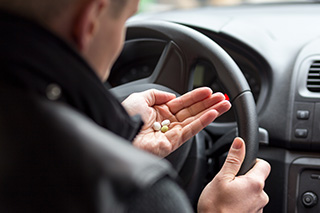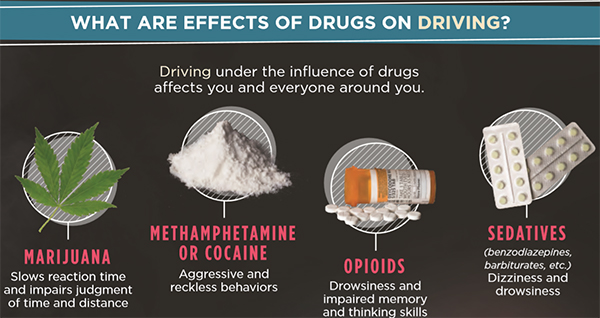Check out a few key frequently asked questions and answers about drug-impaired driving below.
What is drug-impaired driving? Driving under the influence of over-the-counter medications, prescription drugs, marijuana, or illegal drugs.
How common is drug-impaired driving? In 2020, 12.6 million people (ages 16 and older) drove after using illicit drugs. Of that total,11.7 million people were under the influence of marijuana (2020 National Survey on Drug Use and Health: Detailed Tables).
This is a slight decrease from 2019 when 13.7 million people (aged 16 and older) admitted to driving after using illicit drugs.
In 2016, 44 percent of drivers in fatal car crashes (with known results) tested positive for drugs, according to a report entitled "Drug-Impaired Driving: Marijuana and Opioids Raise Critical Issues for States" by the Governors Highway Safety Association. This is up from 28 percent in 2006.

Why is drug-impaired driving dangerous? Over-the-counter (OTC) medications and drugs affect the brain and can alter perception, mental processes, attention, balance, coordination, reaction time and other abilities required for safe driving. Even small amounts of some drugs can have a serious effect on driving ability.
A national survey showed 22.5% of nighttime weekend drivers tested positive for illegal, prescription, or OTC drugs that can impair driving. (Drug-Impaired Driving: A Guide for States, April 2017. NHTSA 2014 Drug-Impaired Driving Survey)
What substances are used the most when driving? After alcohol, marijuana is the most commonly used drug. (Source: National Institute of Drug Abuse)
What happens when you use drugs and drive? Marijuana can decrease a person’s ability to drive a car. It slows reaction time, impairs a driver’s concentration and attention, and reduces hand-eye coordination. It is dangerous to drive after mixing alcohol and marijuana. Driving after using prescription drugs or over-the-counter medicine, such as cough suppressants, antihistamines, sleeping aids, and anti-anxiety medications may impair driving ability.
Check out the graphic below from the National Institute on Drug Abuse about the effects different drugs can have on driving (click to enlarge).
Is it legal? Even in states that have legalized marijuana for recreational use, driving while under the influence of marijuana is still illegal. Unfortunately, too many people are misinformed. A study conducted by Liberty Mutual Insurance and Students Against Destructive Decisions (SADD) found that a third of all teens believe it is legal to drive under the influence of marijuana. In addition 27 percent of parents believed it was legal.
Not only is driving while high illegal, it's also very dangerous. According to the National Institute on Drug Abuse, the effects of marijuana can include: altered senses and sense of time, slow reaction time, anxiety, hallucinations and more.
PARENTS - tell your teen not to drive after using marijuana or other drugs, and don’t get in a car with a driver who has used marijuana or other drugs!
Remember: Marijuana and many medications act on parts of the brain that can impair driving ability. Many prescription drugs have warning labels against the operation of machinery and driving motor vehicles, for a certain period of time after use. You are more likely to be injured or in an accident while driving while under the influence of marijuana or prescription drugs.
In the News: With Pot Rules Relaxed, More U.S. Teens Driving While High: Study



